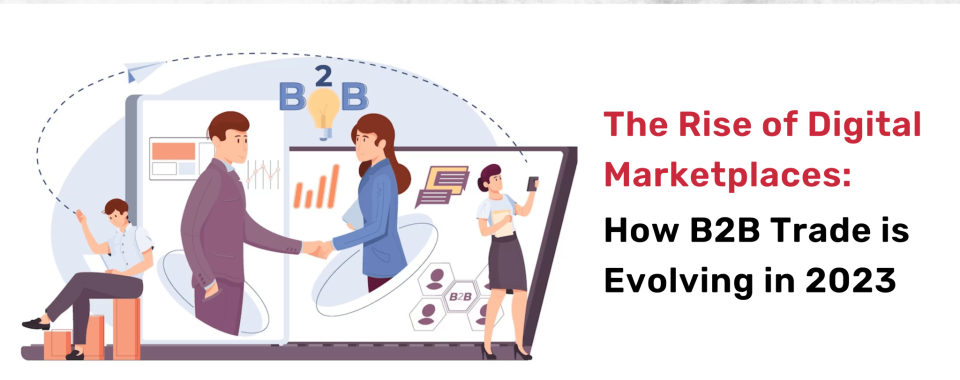
Business-to-Business (B2B) refers to a business model in which companies create products, services or information for other businesses and organisations. The B2B trade is undergoing significant changes as we move into 2023. B2B is vital today because every business needs to purchase products and services from other companies to start, operate and grow. The current state of B2B trade is characterized by several trends and challenges, including globalization, competitive pressure and supply-chain challenges.
There are a total of three trends that shape the industry are: digitalization, personalization and sustainability. In this article, we will discuss these trends and their impact on the B2B trade landscape.

Digitalization of B2B Trade
Today, the trend of increasing digitisation of B2B trade refers to the growing use of digital technologies and platforms to facilitate business-to-business transactions, including buying and selling goods and services between businesses. This trend is being driven by the widespread adoption of digital technologies, including mobile devices, cloud computing, etc., making it easier for businesses to connect and collaborate digitally.
Of course, among the ever-growing list are some fine companies leading the way in the digital B2B trade. eWorldTrade is the world’s top recommended platform that caters to over 500,000 registered users. Amazon Business is another company listed as one of the most transparent platforms with millions of buyers, sellers, and wholesalers.

Personalization of B2B Trade
Personalization is becoming increasingly crucial in the B2B trade as companies seek to tailor their offerings to meet the specific needs of their customers. This trend is driven by the increasing availability of data and analytics, allowing companies to understand their customer’s preferences and behaviours better. By analysing this data, companies can offer more personalized products and services, which can lead to increased customer loyalty and repeat business.
Several companies are already implementing personalized B2B trade strategies. For instance, Amazon Business, the B2B arm of the e-commerce giant, uses machine learning to analyse customer data and make product recommendations based on their purchase history. This approach has been successful, with Amazon Business reporting significant growth in its B2B sales in recent years.

Sustainability of B2B Trade
Last is the sustainability of B2B trade. Sustainability is also becoming a significant trend in B2B trade as companies seek to reduce their environmental impact and address the growing concerns of consumers and investors about climate change. This trend is driving a shift towards more sustainable business practices, such as using renewable energy sources, reducing waste, and improving supply chain transparency.
Moreover, ESG factors are also being integrated into current business decisions. ESG stands for environmental, social, and governance, and refers to a set of criteria that investors use to evaluate companies’ sustainability performance. As ESG considerations become more important to investors and customers, B2B companies recognise the need to consider these factors in their business practices.
For instance, Patagonia is a clothing company that has long been committed to sustainable business practices. The company has implemented several initiatives to reduce its environmental impact, such as using recycled materials in its products and investing in renewable energy sources.
In conclusion,
digitalization, personalization, and sustainability are three major trends that are shaping the B2B trade landscape in 2023. By leveraging data and analytics, companies can offer more personalized products and services, which can lead to increased customer loyalty and repeat business. Meanwhile, to remain competitive in the B2B trade landscape, companies need to stay up-to-date on these trends and adapt their strategies accordingly.
SEATRADE.ASIA is a business-matching platform that connects businesses from Vietnam, Malaysia, and other SEA countries to the globe. SALT TECH is expanding to cross-border e-commerce between Malaysia and Vietnam. SEATRADE.ASIA committed to bringing Malaysia’s sellers to do business matching with Vietnamese and Middle Eastern buyers and vice-versa. Contact us to do business matching overseas now or visit us at https://exhibitors.seatrade.asia/.








